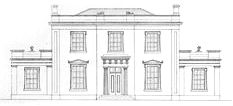Age
We know that John married Fanny Ferrars just after he came of age (which was typically around 25 for men at the time), and has a 5-year-old son, so it’s likely that John is about 30, making him considerably older than his Dashwood sisters.
Family and Situation
John Dashwood is the son of Henry Dashwood by his first wife and the heir to Norland Park in Sussex. This makes him the nephew of his old maid Aunt Dashwood, stepson of Mrs. Dashwood and half brother of Elinor, Marianne, and Margaret Dashwood. John is married to Fanny Dashwood née Ferrars, who we are told he married soon upon coming of age and through which “he added to his wealth.” John and Fanny have a young son named Henry who they call Harry.
The narrator tells us that John “was amply provided for by the fortune of his mother, which had been large, and half of which devolved on him on his coming of age,” with the remainder presumably going into the Norland Park estate that John would eventually inherit.
After John had married Fanny and fathered little Henry, his father moved to Norland Park to live with Uncle Dashwood in preparation for his inheritance of the estate. Over this time, we are told, that John and Fanny visited occasionally with their toddler son who so won over Uncle Dashwood’s affections that by the time he died, “the whole [estate] was tied up for the benefit of this child.”
A year later, Henry Dashwood dies, leaving Norland Park to John and asking him to promise to look after his sisters and step-mother. After thoughtful consideration, John determines that his father did not mean financial assistance.
Several months after John has inherited Norland, Elinor has an illuminating conversation with him that suggests he finds the income from the estate to be less than he might desire. At the start, he mentions in passing that Mrs. Ferrars had given him and Fanny £200 for various expenses associated with coming to town and then outlines various “improvement” efforts that are taxing his income and currently underway at Norland, including the enclosure of Norland Commons, the purchase of East Kingham Farm, the redecorating of the home after Mrs. Dashwood removed her own houseware, a large amount of landscaping, and the construction of a new greenhouse.
When in town, John and Fanny rent a house in Harley Street, suggesting that they do not already own a London home.
Character
John, we are told, is “a steady respectable young man.” The narrator elaborates, saying “He was not an ill-disposed young man, unless to be rather cold hearted and rather selfish is to be ill-disposed: but he was, in general, well respected; for he conducted himself with propriety in the discharge of his ordinary duties. Had he married a more amiable woman, he might have been made still more respectable than he was:—he might even have been made amiable himself; for he was very young when he married, and very fond of his wife. But Mrs. John Dashwood was a strong caricature of himself;—more narrow-minded and selfish.”
Early in the novel, John Dashwood distinguishes himself by opting to keep the entirety of his inheritance to himself, rather than spreading it out among his sisters. John does occasionally evidence remorse about this -- at one point suggesting that surely Mrs. Jennings will leave Elinor and Marianne her money -- it does not appear to be enough to prompt him to change his lifestyle or rethink his decisions. He does spend considerable energy in the second half of the novel attempting to find husbands for his sisters, even drawing Brandon’s attention to screens which Elinor had painted and were displayed in the John Ferrars’ dining room.
John does, we know, enjoy having money and privilege. He outlays substantial sums of money on “improvements” at Norland Park and when Elinor and Marianne attend a dinner party at the Dashwood’s London house, we are told “In spite of the improvements and additions which were making to the Norland estate, and in spite of its owner having once been within some thousand pounds of being obliged to sell out at a loss, nothing gave any symptom of that indigence which he had tried to infer from it.”
As a conversationalist, we know John is not especially talented. Of the same dinner party, the narrator says there was a poverty of conversation, for “John Dashwood had not much to say for himself that was worth hearing, and his wife had still less.” He also shows himself to be calculating and unsentimental; once while discussing the possibility of Robert succeeding Edward in courting Miss Morton, John says that he sees no reason it should bother anyone “for Robert will now to all intents and purposes be considered as the eldest son;—and as to any thing else, they are both very agreeable young men: I do not know that one is superior to the other.”
